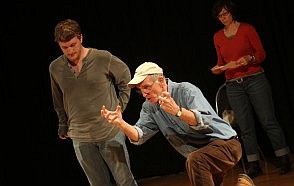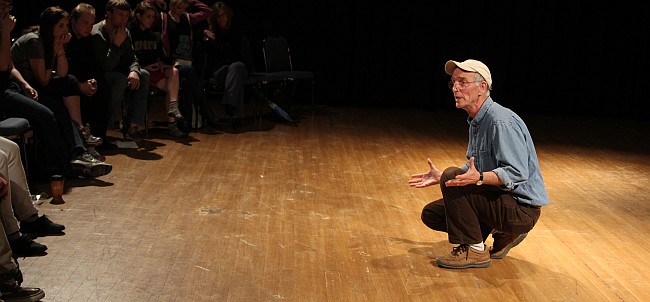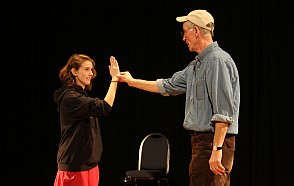The Spring Spectacle of Shakespeare: Mentor Kevin Coleman
February 13, 2018
 The seventh annual Spring Spectacle of Shakespeare at DePauw University is Saturday, May 5, in Moore Theatre of the Judson and Joyce Green Center for the Performing Arts. The event is a collaboration between Shakespeare & Company Fall Festival of Shakespeare in Lenox, Massachusetts, DePauw, and all four of the Putnam County school corporations.
The seventh annual Spring Spectacle of Shakespeare at DePauw University is Saturday, May 5, in Moore Theatre of the Judson and Joyce Green Center for the Performing Arts. The event is a collaboration between Shakespeare & Company Fall Festival of Shakespeare in Lenox, Massachusetts, DePauw, and all four of the Putnam County school corporations.
This year’s Spring Spectacle features students from Greencastle Schools performing The Merry Wives of Windsor, Cloverdale Community School students performing Much Ado About Nothing, North Putnam Community Schools are performing As You Like It, and South Putnam Schools are doing A Midsummer Night's Dream.
Kevin Coleman, director of education at Shakespeare & Company, recently completed his 7th two-week residency on campus training DePauw students in the “Shakespeare in the Schools” course, which gives them essential tools for directing the plays in the county schools. Coleman also presented three workshops for students and faculty during his stay at DePauw. The workshops were designed to provide helpful insights for understanding and performing Shakespeare. Many took advantage of the Clown workshop, a Monologue Workshop and a“Feeding-In” Rehearsal Method Workshop.

Over it’s 40-year history Shakespeare & Company has honed a successful approach to bringing Shakespeare alive for young people. “This approach to teaching Shakespeare changes everything,” Coleman explains. “Reading and discussing your interpretation of his works in class has a very short shelf life. When you do Shakespeare and actually get serious about treating a play as if it were a play and treating a script as a script, it tends to stay with you for the rest of your life. When you do these parts, when you say these words, think these thoughts and feel these feelings, you embody them and move around on stage, and then it becomes a part of who you are,” Coleman says. “It’s not just something you remember.”
“Shakespeare is giving words to such deep fundamental human experiences,” he explains. “These young students are in the throes of adolescence – experiencing a whole gamut of emotions – betrayal, love, hurt, happiness and hopelessness. Most of these kids have no adequate language to put words to these emotions or to express what’s going on with them.”
DePauw Spring Spectacle Program Director and Assistant Professor Gigi Jennewein concurs,“Shakespeare is the ideal script to put into the hands of adolescents. They don’t have epic language, but everything they experience is epic. We’re not doing Shakespeare for young people,” Jennewein explains. “It’s not children’s theatre. We’re doing Shakespeare with adolescents.”
The Spring Spectacle of Shakespeare at DePauw is modeled after the Fall Festival of Shakespeare offered annually by Shakespeare & Company, which Coleman started more than three decades ago. He wanted to bring the performance aspects of the plays into the schools at that time in K-12 education when kids read Shakespeare for the first time, a time when it’s very possible they won’t like it.
“Thirty-one years ago – by trial and error – this [interest] developed into a whole methodology and ethic and aesthetic, and it’s not taking the professional model and imposing it on a school,” Coleman explains. “The Spring Spectacle is such a perfect example of giving kids the experience of the art form that is theatre.” The program as designed is open to all, which can result in interesting creative fun. "It’s inclusive," stresses Coleman. “So, of course, we can have five Lady Macbeths and five Macbeths, and three of them can be girls.”
 Shakespeare & Company’s Fall Festival of Shakespeare has been replicated at several theatre companies and a few Universities across the country. DePauw is an early adopter of the program and has adapted the Fall Festival to meet the schedules and skills of University students. Whereas the Fall Festival employs young, professional actors and directors, some of the DePauw students are studying theatre and some are not; and some have no experience with Shakespeare, acting or teaching. All, however, do have an interest in working with younger students and are passionate about community engagement.
Shakespeare & Company’s Fall Festival of Shakespeare has been replicated at several theatre companies and a few Universities across the country. DePauw is an early adopter of the program and has adapted the Fall Festival to meet the schedules and skills of University students. Whereas the Fall Festival employs young, professional actors and directors, some of the DePauw students are studying theatre and some are not; and some have no experience with Shakespeare, acting or teaching. All, however, do have an interest in working with younger students and are passionate about community engagement.
With every visit to DePauw Coleman marvels at the transformation in the DePauw students once they start working with the Shakespeare & Company methods for directing in schools. “They love it once they start doing it,” he says. “And every student in the class has talents that are needed to make the play happen. When you deal with Shakespeare as a script, a play or a story to be told out loud to witnesses, the complexity just increases – not arithmetically, but geometrically.”
While highlighting the importance of the Spring Spectacle of Shakespeare for the county students Coleman says, “Twenty years from now, the kids’ understanding of a Shakespeare play is going to be richer. In 40 years, richer still. For right now, they may not have it all, but they have it. Let them tell the story through performance, and they’ll remember it the rest of their lives.”
Back